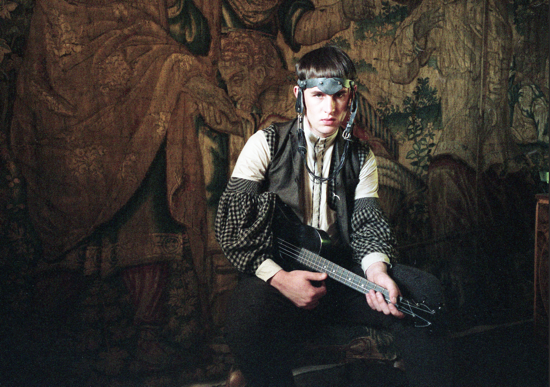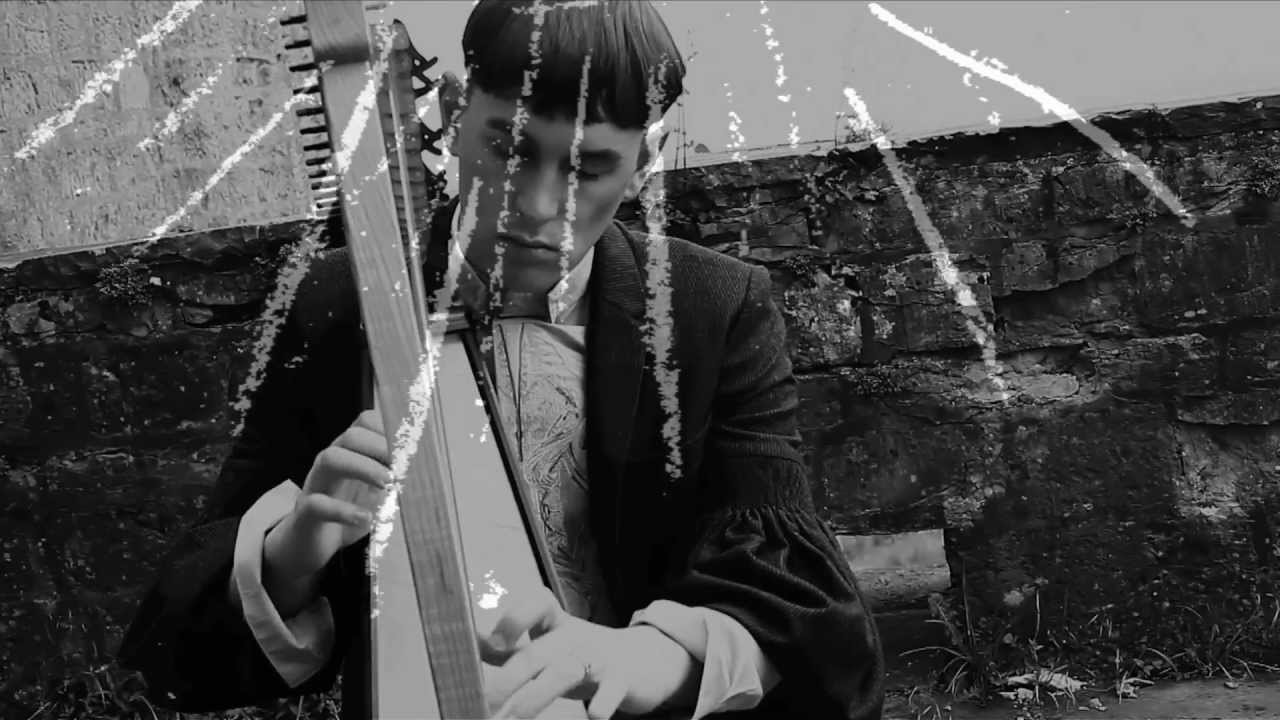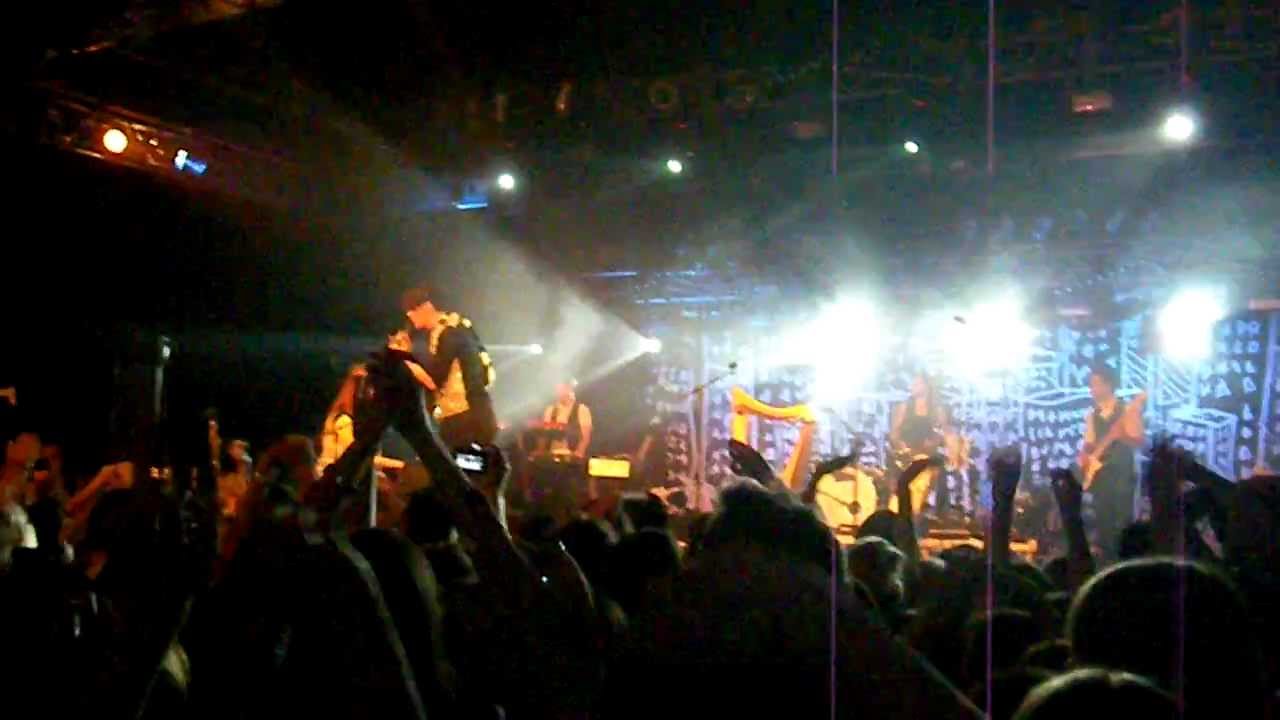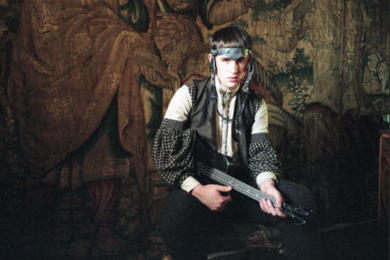Long-time Quietus favourite Patrick Wolf has a new album, Sundark & Riverlight out tomorrow, September 25, via Bloody Chamber Music/Essential Music.
To celebrate ten years of making music, he’s re-recorded 16 songs from his back catalogue using exclusively acoustic instruments and analogue recording techniques – have a watch of the video to the new version of ‘Overture’, originally on 2007’s The Magic Position:
Wolf is also dedicating the album to his Russian fans, highlighting the difficulties faced by LGBT men and women in the country. The new version of ‘Bermondsey Street’ features fans’ spoken word versions of lyrics Wolf improvised for the song during a performance in Moscow in 2011, on the day riots began in the city against the anti-LGBT ‘propaganda’ bill being passed in Saintt Petersburg and on the front cover of the album, he holds the “Gusli”, a traditional instrument given to him by his Russian fans, as a message of hope.
We spoke to Patrick, currently in the middle of a US tour about why he wanted to address these issues with the album, as well as the experience of taking a retrospective look over his career.
Last time we talked to you, you mentioned you were thinking of leaving London – are you basing yourself in America now?
Patrick Wolf: No, anywhere that I end up really! So rather than coming back after the show, I’ve always dreamed of staying on. Part of the tour finished in Paris and I stayed on for a week there, and then I just want to do that for a year or two and see what happens. Put everything in storage and just carry two suitcases – it’s a very different way of touring. It’s a lot more inspiring, I guess.
Will you be doing a lot of writing on the road?
PW: Yeah, because I think, doing this album, focussing so much on work and stories that I already knew, it gave me so much space in my head, with no deadline or pressure to come up with another album. I wanted it to be like when I first made an album, without deadlines and people looking down over what I was doing, and I guess you have that freedom that comes with travelling, where no one can ever get hold of you.
So will this draw a line under the last ten years of music and send you in a new direction for the next album?
PW: Yeah, I don’t think I realised that that would be what I got out of it, because when I’m making an album of new material, I do find that I’ve lost some emotional baggage. But with this being focussed on the past, I didn’t realise that it would have the same effect. It was a bit like having an emotional facelift.
At the beginning, when I had a look over all the songs that I’d written over the years. I was asked to create a biography in book form of my lyrics, and that just seemed like a project that would take me way past the mark of the ten year anniversary, so I ended up making an album instead. But I just felt really old – at 29, I just felt heavy, like heavy with a lot of songs, and I thought I’ve got to shine a focus on the ten songs, or ten messages, that mean the most to me, so in a way, I can almost forget the last ten years and just take with me, like out of a house fire, the ten things that I would want to save and burn the rest. So it ended up being 16 songs and a kind of double record.
I was able to analyse any repetition in my work – it was like doing three or four months of scrawling, just going through all the lyrics of every song and deciding what I thought was immature and what I thought was not great work and what I thought I could do better with in the future.
What’s the selection process? How do you decide which ones you grab from the burning building?
I started grouping things together. I wrote down every song and plastered them all across the studio down at Real World. I went down with absolutely no obligations really, I just booked studio time out of my own pocket and I didn’t have to explain to anybody before I went down what I was doing or demo anything. So it left the freedom to really eliminate, in the studio, anything that sounded too similar – I would find four songs that, actually, once you strip away the production and the time they were written in, when you put them next to each other, they were actually maybe too close in terms of subject matter or chord structure.
That made me feel really guilty and really embarrassed, because I felt like I’d done something original and unique and actually when you look at the songwriting, I guess, over five albums, I did spot quite a bit of repetition.
Why was it so important to use entirely acoustic instruments and analogue production processes?
PW: I think that, again, through listening to the albums and the extreme difference in production of each one – the microphones that I used on the first album (2003’s Lycanthropy) and the third (2007’s The Magic Position) were really not suitable for my voice. I really didn’t realise, because I never went to school for it. I thought it would be nice to give these songs a really classic, really professional engineering style, so it was about shining a light on my voice as it is now and I didn’t want too much clutter and production around it.
I don’t know what’s happened at the moment, but I feel that I’m not connected to electronic music. I don’t know if it’s that it seems too easy. I just find that everything sounds the same and I know all the plug-ins and all the free software that everyone’s using and I don’t see much mystery or magic to it at the moment. At the moment, I still believe in electronic music, but I feel that it’s hit a ceiling with it all. Things like dubstep, I remember hearing 15 years ago, it’s not new to me, a lot of these things people are saying are new.
I’m really obsessed sometimes with what’s not cool at the time with making albums, and for me acoustic music is a bit of a dirty word right now. There’s a record by Shirley and Dolly Collins, an old English folk record, and you can hear them coughing at the end of the song and they keep it in. It’s all medieval – it’s totally, totally done organically with one medieval folk drum and a pipe organ and vocal. And then maybe Blue by Joni Mitchell, where there’s only ever three instruments maximum, but you just don’t lose interest throughout the album. You don’t feel "oh my god, I wish there was more!" So I really went down with the three instrument rule.
Was it a case of creative limitation then?
PW: Yeah, definitely. I did have to, otherwise I would have been there for years. I think that all my albums have had an aesthetic before I go in, of what it’s going to sound like and what ingredients I’m going to use in the production. So, it was a brand new thing to go totally acoustic with it all. There’s only one drum, a snare drum, and there’s one bodhran, an Irish drum, but it’s as simple as that really. I wanted to really make sure the string and woodwind instruments are holding together rhythmically, that they didn’t need a drum behind them, so it was a challenge. I also listened tons to John Cale and Nico’s acoustic productions, because to me, I never listen to this and go "oh this is acoustic or electric", I just really get taken to a place that is a really beautiful exploration of instruments. That’s why I started doing things like bowing my harp. I had an aesthetic, and I stuck to it.
You recorded in Peter Gabriel’s Real World Studios, and borrowed a few instruments from him. Did he give you any advice? Any involvement on the record?
PW: No, it was kind of like the Wizard of Oz down at the studios. There was a Yamaha grand piano – it was a shame, it was such a beautiful wooden studio, but I hated the piano and it was really wrong for the record. I asked if there was any way we could hire one in and then Peter Gabriel stepped in and said I could borrow his Bosendorfer from his writing studio, which is the first time it’s ever happened. The Bosendorfer is like my dream piano and knowing that it had been behind so many records, that was a nice early blessing on the record.
Did Gabriel emerge from behind a curtain then?
PW: No! It’s very expansive; there are three different areas. The whole thing about Real World is that even if there are other bands working there – so like Dappy was actually down there at the same time, and he was trying to buy me out of my studio because he was trying to finish his album and I was holding fast! But I was panicked, because I thought "oh no, it’s going to be a metropolis of musicians and people", but I pretty much felt that I was in solitude the whole time.
How do you feel the songs have changed over the course of time?
PW: I think that’s all coming through live experience and becoming less scared of changing the song on the night for myself or for the audience or – it’s a dirty word! – doing medleys, dropping in bits of songs in at the beginning of others, not like in an ABBA way but in a more experimental way. I love touring so much, but I hate when it becomes like a repetition of set lists. So I’m really experimenting with taking the song up to nine minutes. Basically I just thought about my favourite moments of transformation of the songs live over the years. I sometimes do annual shows the opposite of how the album sounds, with the big orchestra playing at the Palladium or the Nan Goldin classical piece. So I have heard the songs over the years outside of the album briefly transformed.
It feels like, with the new version of ‘Bermondsey Street’ and the image of you holding the “Gusli” on the front cover, the difficulties faced by Russian LGBT men and women is a key theme for the album – why now?
PW: Well, I did my first show in Russia very, very early on. It was one of my first invitations overseas and it was back at the end of Lycanthropy, that tour was pretty much the UK and then Russia: it was so bizarre! It was sponsored by the British Council. There was this real openness at the time to Russia. People were telling me "be careful with this, don’t look like this" and I just felt very, very connected to and amazed by the audience. I found them almost 100 times more rebellious and interesting than I would have experienced in rock n’ roll crowds in London. So I felt this real sense of liberation – I hadn’t sold many records there but they all had these mental bootleg CDs, it was kind of pre-YouTube and they would find self-made recordings and demos and put them on these CDs that they were selling on the streets. I was really shocked and really amazed.
I would go back every few years and it’s funny when you see a country go backwards in terms of human rights or culture. I just found it really sad, it’s like a friend of yours slowly being eaten up by a disease. One of my best friends and the main violinist in my band is Russian, so we would get her opinion with the politics, because her father lives in Moscow, so we had this overall Russian aesthetic to the tour and jokes. And then, very quickly, over two years, I started to become very interested in this charity All Out, which keeps an eye on international lesbian and gay rights across the world and produces some really fascinating information and the chance to make a difference through petitions.
When the Lupercalia album came out, there was a show we did in Moscow. There was still the petition to change the anti-gay law in Russia, so I was talking a lot about it online and thinking about what it would mean, standing on stage in front of this audience and thinking that I couldn’t be honest about who I am and tell people it’s okay to be who you are, which is fundamental to performance. Whether you are gay or straight, that power and ability to make people feel okay about being an outsider or to alleviate any suppression even for just an hour during the show, that would be taken away. What I do, when I go to somewhere like Russia or Poland, just the fact that there is an out-gay performer there on stage, and my audience are young gay, my audience is 13/14 year-old girls and boys up to twenties and thirties, it’s quite different to how it is in England and America, so I’m like a rebellious figure, I guess, to them. I do speak out and I do try and inspire people to be strong, so I guess it got more like that.
First seeing that on a really personal selfish level, and then seeing how that would spread to that 14 year-old boy dressed up for the show – they all had to change after the show and basically put on tracksuits to leave and feel safe to go home. So I sang ‘Bermondsey Street’, and I hadn’t really had it make any impact on the tour so far, and here it was like the crazy moment of the show. It’s quite a subdued song, but people were going mental for the lyrics and so we ended up turning it into a nine minute song, and I ended up improvising some of the lyrics, against the government and "no fear of society" and it was a real moment and me and my violinist were crying and it was really crazy!
So that happened and I came back and started to make this album. The law was passed [bills banning the spreading of pro-LGBT propaganda have been put in place in eight regions in Russia over the last six years] and I realised that it was going to be very hard for me to go back to Russia, hard for my crew, very dangerous, and extremely expensive, because promoters are very on it there – they’re aware of what you’re thinking, saying and doing and so it’s become pretty much impossible for me to go back to Russia until the law is changed. We looked into it, and the only way I can go back now is if I play for aristocrats, people who have tons of money and can have very private shows.
On one of my tours I was given an instrument – all my fans saved up and they bought this instrument called the "Gusli", one of the ancient folk instruments like a lyre, it’s a beautiful instrument. Then I just thought I’d dedicate this album to my fans in Russia, because out of anyone, they’re the ones that won’t be able to see the show, so it’s a message of hope to hold that on the front cover. Then I went on YouTube and found the performance of ‘Bermondsey Street’ that I’d done and offered it to my Russian friends to do spoken word versions. I was going to put them in the five minute bass breakdown at the end, but there was this one that came through in an e-mail and was so passionate and almost like a statement of military intent with so much heart that I thought it had to open the song. And then the most beautiful thing is all the messages of support that came for the issue: on the song we’ve got Mexican people, Cantonese, Polish. I’m really proud of how it sounds now: I was scared when I made it that the production was too lightweight but now I feel it’s really where it’s meant to be; hopefully I’ll look back on that song and think it will be a moment in time.
Do you think there’s any hope in the current situation?
PW: I do because people care, and I think the world is listening this time. Sometimes with international politics, when it comes to lesbian and gay politics, a lot of the time, they’re the first rights to go. People should be more aware of it – they’re the first scapegoat most of the time, and then women’s rights come second. It’s interesting that the first big thing was the St Petersburg bill, which nobody cared about to be honest – I wrote to people, friends of mine, celebrities, film stars, to see if anybody would put at least one Tweet aside for this petition. Nobody did, nobody wanted to be involved in it, but then the Pussy Riot thing happened and everybody goes bananas, and I’m so excited that that has happened.
It’s true that women’s rights and lesbian and gay rights do come hand in hand, but I guess there was never a big press moment [with the LGBT bill]. I do think that, hopefully, we’ll get to a point where we don’t need those big press scandals, where we can stay a bit more in tune with our brothers and sisters around the world. I think there is a greater window of opportunity now – you can sign petitions to politicians, and after the Pussy Riot thing, I can really see it’s exciting that everyone else has woken up to it.





